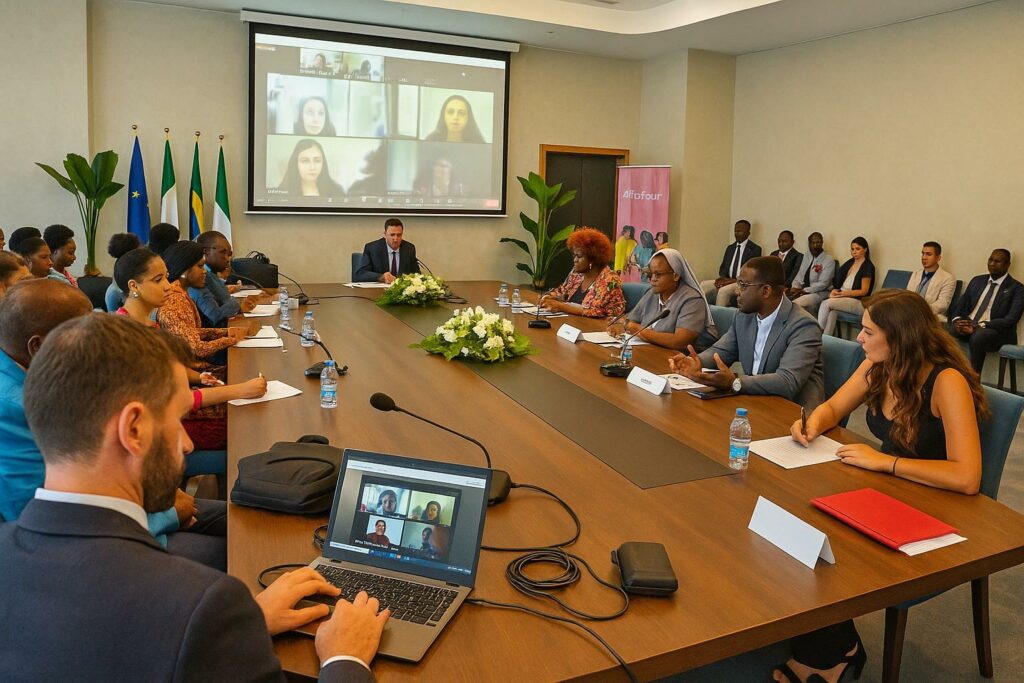Italian Week Unites Brazzaville Italophones
On 17 October 2025 the Hilton Twin Towers hotel overlooking the Congo River became, for a day, a microcosm of Mediterranean culture. The Embassy of Italy gathered seasoned professionals, scholars and students to mark the twenty-fifth edition of the worldwide Settimana della Lingua Italiana nel Mondo. Beneath chandeliers and conference microphones, Ambassador Enrico Nunziata recalled that Dante’s idiom first reached Brazzaville with missionaries and oil engineers, and that it now underpins an increasingly dense web of people-to-people exchanges. The hybrid seminar, streamed to Pointe-Noire and Rome, revolved around the theme “Italian beyond borders – opportunity, culture, identity in Congo.” Testimonies multiplied: an engineer praised technical vocabulary learned in Turin, a former CEMAC commissioner credited Siena for his grasp of regional economics, and a parish priest explained how the language fosters community projects in Oyo. Their narratives converged on one point: Italian has ceased to be an exotic curiosity and is becoming a vector of social mobility.
Language as Soft Power in Mediterranean-Africa Axis
For Rome, linguistic outreach is no longer an ornamental gesture; it is embedded in foreign policy. The Ministry of Foreign Affairs places SLIM under the patronage of the President of the Italian Republic, aligning it with the broader Mattei Plan that promotes co-development with African partners. Quoting Vice-Premier Antonio Tajani, Ambassador Nunziata stressed that “Italian is the language of dialogue and of the future.” In diplomatic practice, the formula translates into scholarships, residencies for Congolese artists in Bologna, and technical courses for public servants in Florence’s Scuola Superiore Sant’Anna. Such initiatives complement traditional energy cooperation with ENI Congo, giving the partnership a human texture. Observers note that by investing in language, Italy cultivates goodwill that may prove decisive in competitive sectors such as green hydrogen or port logistics, areas where Brazzaville seeks diversified investors while maintaining its sovereign development agenda.
Academic Partnerships Fuel a Skilled Youth Pipeline
Since the early 2000s, the Department of Italian Studies at Université Marien-Ngouabi has trained several hundred graduates. According to linguist Alain Loussakoumounou, who addressed the seminar, enrolment rose by a third in the past five years, buoyed by demand from translation companies and shipping lines active in Pointe-Noire. Complementing tertiary education, the Enrico Mattei School offers full-cycle bilingual curricula to 300 pupils, introducing STEM concepts in Italian from primary level. Private centres in Brazzaville add evening classes targeted at entrepreneurs keen to negotiate directly with machinery suppliers in Lombardy. Participants underscored that linguistic competence often unlocks scholarships from Italian regions, internships within fashion houses or apprenticeships at Modena’s automotive cluster, thereby reducing youth unemployment. The embassy’s proposal to launch a digital platform linking alumni, recruiters and Italian SMEs was greeted as a pragmatic step toward a structured talent pipeline.
Culture Meets Economy: The Mattei Plan Dimension
Beyond education, speakers insisted on Italian’s capacity to accompany strategic sectors identified in Congo’s National Development Plan 2022-2026, notably agribusiness, wood transformation and tourism. Economists pointed out that Northern Italy’s cooperative model offers replicable practices for agro-processing clusters around Ouesso. Meanwhile, heritage experts envisage joint cataloguing of colonial-era architecture, a project that could anchor cultural tourism circuits from Brazzaville to Padua. Within the Plan Mattei, such ventures are conceived as co-investments rather than aid, echoing Congo’s vision of mutually beneficial partnerships articulated by President Denis Sassou Nguesso at recent CEMAC summits. The embassy stressed that the language component facilitates contract negotiation, regulatory compliance and corporate social responsibility alignment, thereby reducing transaction costs for both parties.
Key Takeaways
Friday’s commemoration demonstrated that linguistic diplomacy can intersect with skill formation, economic diversification and cultural stewardship. Stakeholders agreed on three priorities: consolidating existing Italian courses through updated didactic materials; mapping labour-market needs so that curricula anticipate sectoral demand; and formalising the italophone network to give it institutional visibility. The approach reflects a shift from symbolic events toward measurable impact, in line with contemporary public-policy standards.
Legal and Economic Context
Under Congolese law, foreign language centres operate within the framework of decree n°2010-437 on private education, which requires curriculum approval by the Ministry of Higher Education and adherence to labour regulations. Embassy officials indicated that ongoing discussions aim to simplify work-permit procedures for visiting Italian lecturers, while preserving quota safeguards for national teaching staff. From a macroeconomic standpoint, the promotion of Italian dovetails with Brazzaville’s objective to attract diversified FDI and to increase the share of non-oil sectors in GDP from 12 % to 25 % by 2030. Analysts note that linguistic competency reduces information asymmetries, a factor highlighted in Doing Business 2020 when assessing contract enforcement in bilingual environments. In this sense, the Italian Language Week resonates not only as a cultural celebration but as a strategic contribution to Congo’s pursuit of sustainable, inclusive growth.

